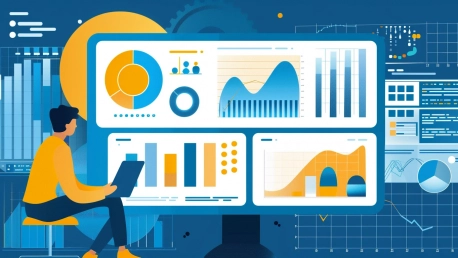Nigeria is on the cusp of a transformation, positioned to leapfrog into the digital age by embracing Artificial Intelligence (AI) and Data Analytics. The nation is capitalizing on these innovations to anchor growth and propel sectors such as finance, healthcare, agriculture, and manufacturing into improved efficiency and productivity. The journey is marked by both remarkable opportunities and formidable challenges.
Pioneering Digital Transformation Through AI
AI in Finance and Fraud Detection
Nigeria’s financial sector is experiencing an AI revolution where algorithms refine risk assessment and enhance customer experiences. AI fosters an environment where transactions are seamless and tailored to individual preferences. The technology is particularly pivotal in fraud detection – sophisticated AI systems scrutinize patterns within large datasets to identify inconsistencies, shielding institutions and clients from financial malfeasance. By incorporating AI, banks and financial services in Nigeria are optimizing their operations and elevating the security of their platforms.
Revolutionizing Healthcare with AI
The deployment of AI within Nigerian healthcare promises a seismic shift in patient outcomes and system efficiency. AI-powered tools are facilitating quicker and more accurate diagnoses, thereby revolutionizing patient care. By leveraging machine learning, medical data can be analyzed with unprecedented speed and precision, enabling early detection of diseases and customization of treatment plans. This transformative technology is driving a renaissance in Nigeria’s healthcare sector, potentially reshaping the prognosis for millions and streamlining the operational aspects of care delivery.
The Power of Data Analytics in Sectoral Development
Agriculture Boosted by Data-Driven Decisions
In the realm of agriculture, data analytics serves as a lighthouse for Nigerian farmers, guiding them towards enhanced productivity and sustainability. By dissecting climate patterns, soil conditions, and crop cycles through data, farmers can make informed decisions that improve yields and ensure food security. Data Analytics merges traditional farming wisdom with cutting-edge insights, underpinning an agricultural revolution that feels both ancestral and futuristic—a boon for a nation where agriculture remains a cornerstone of the economy.
Manufacturing and Supply Chain Innovation
In the manufacturing sphere, AI and analytics are quietly revolutionizing supply chains and production lines. Predictive maintenance, powered by data insights, is minimizing downtime by preempting equipment failure. These innovations are not only ensuring the smooth operation of machinery but are also contributing to a culture of proactive intervention and strategic planning. As Nigeria continues to harness these technological tools, its manufacturing base stands to witness heightened efficiency and productivity, essential for economic growth.
Addressing the Roadblocks to Digital Success
Infrastructural Challenges and Remedies
Despite the potential, Nigeria’s digital aspirations are tethered by infrastructural constraints. Unreliable internet connectivity and power supply issues are significant impediments to AI and Data Analytics adoption. However, recognizing these as catalysts for growth, the government and private sector are investing in infrastructural upgrades and policy reforms. These initiatives aim to provide the necessary backbone for the technologies to flourish, ensuring that the digital divide is bridged and that tech-driven solutions are accessible to all.
Skill Development and Educational Imperatives
The transformative power of AI and Data Analytics is contingent on the availability of skilled professionals. Nigeria faces a talent deficit in this arena, prompting concerted efforts in education and capacity-building. Initiatives that focus on skill enhancement, vocational training, and higher education curriculum reform are underway to breed a new generation of tech-savvy professionals. These endeavors are critical in constructing a robust foundation for a resilient and adaptive workforce, ready to navigate the intricacies of a digital era.
Collaborations and Pathways to Competitiveness
The Role of Public-Private Partnerships
The fusion of state resources and private sector dynamism represents a potent formula for Nigeria’s digital evolution. Public-Private Partnerships (PPPs) are incubating an ecosystem ripe for technological innovation and growth. By pooling expertise, funding, and infrastructure, these collaborations are not only driving progress within individual sectors but are also laying the groundwork for comprehensive national digital transformation. Successful partnerships are setting precedents and illustrating the tangible benefits arising from such synergies.
Engaging the Global Stage
Nigeria stands on the brink of a significant shift, poised to harness the power of Artificial Intelligence (AI) and Data Analytics to jumpstart its entry into a digitally-driven era. This strategic move has the potential to catalyze economic expansion and enhance the productivity and efficiency of critical sectors such as finance, healthcare, agriculture, and manufacturing. As Nigeria embarks on this technologically fueled journey, it encounters an array of impressive prospects that promise to redefine its future. However, alongside these promising opportunities, the nation faces a range of tough challenges that must be overcome to fully realize the benefits of this digital revolution. The path forward is a delicate balance between capitalizing on the potential of AI and Analytics, and navigating the complexities of implementing such cutting-edge technologies within various industries. For Nigeria, this endeavor is not just about adopting new tools but seizing a moment to redefine its place in a global economy increasingly dominated by digital innovation.









